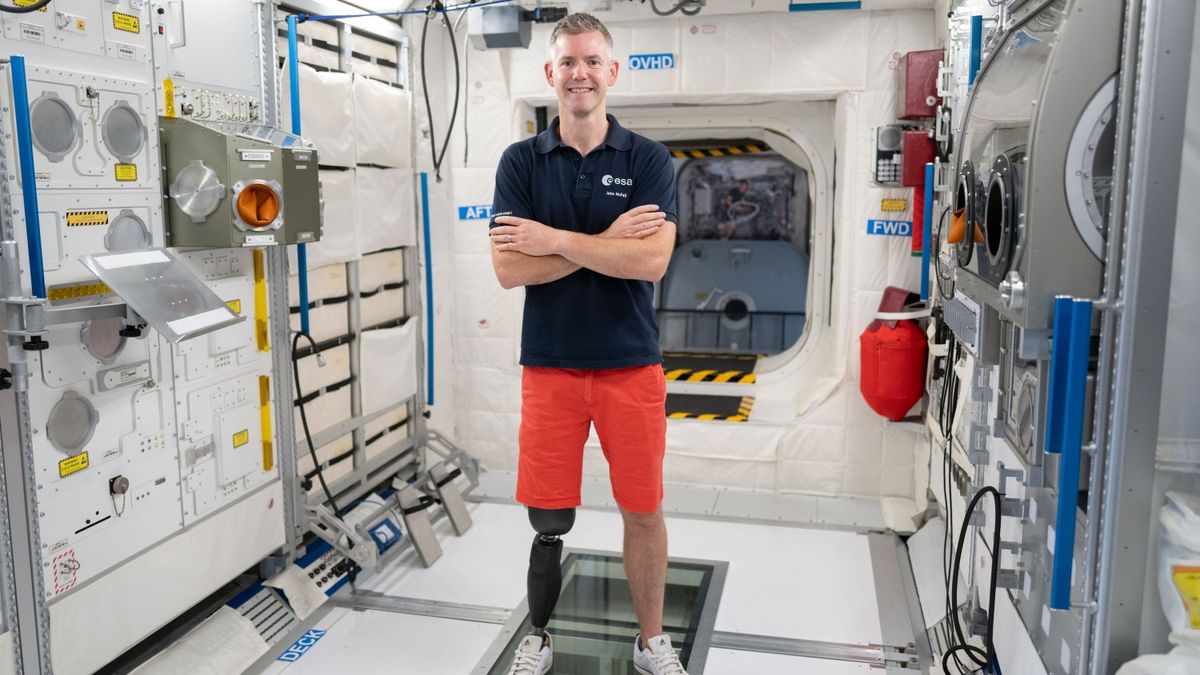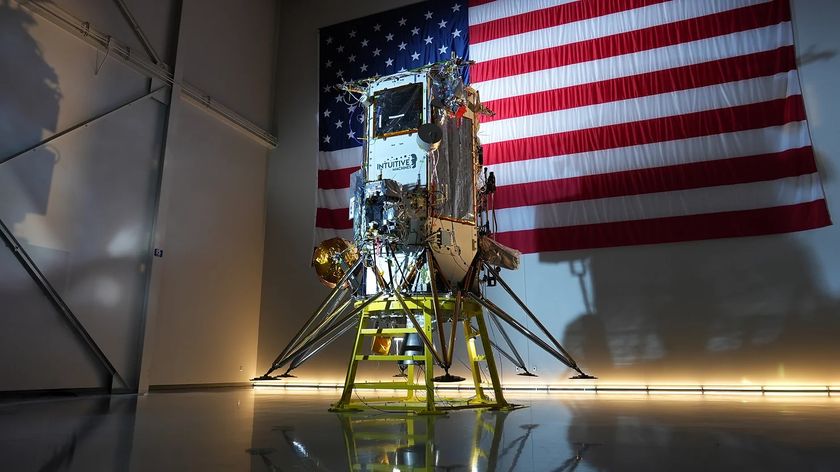Paralympian John McFall could become 1st astronaut with a disability on ISS
McFall does not yet have a mission assignment or timeline for when a potential launch might take place.

This astronaut won't be letting his prosthetic leg ground him to the confines of Earth.
European Space Agency (ESA) reserve astronaut John McFall has just become the first person with a physical disability to be medically certified to launch on a long-duration mission to the International Space Station (ISS). The surgeon and former Paralympian took part in a study to demonstrate the feasibility of the flight, which recently concluded.
McFall was selected for ESA's Fly! Feasibility study in 2022, which aimed to demonstrate the technical viability of flying someone with a disability in space. Now that the study has concluded, McFall and the UK Space Agency are cheering him on toward his next steps: Fly! Mission Ready.
McFall lost his leg when he was 19, as a result of a motorcycle accident. Since then, he's never considered himself a "passive amputee," he previously told Space.com. He won a bronze medal in the 100-meter sprint during the 2008 Paralympics, and has earned a master's degree in biomechanics and gait analysis.
"I'm quite involved in my care. I know how my prosthesis works. I'm a technology demonstrator," McFall said.
Liz Johns, Interim Head of Space Exploration at the UK Space Agency, praised McFall for the milestone in a statement, saying, "it is fantastic to see that John and the team at ESA have proved it is technically possible for someone with a physical disability like his to live and work on the International Space Station. "
Fly! Mission Ready, the next phase of the study, consists of three main components — the types of science that could be conducted during McFall's mission, final qualification of his prosthetics, and a final medical certification. In the statement, McFall hailed the certification as "a really important milestone in the history of human spaceflight."
Get the Space.com Newsletter
Breaking space news, the latest updates on rocket launches, skywatching events and more!
"It's great that we can say after a huge amount of work in the last 18 months that we have demonstrated that it’s technically possible for someone with a disability like mine to fly on a long duration mission," McFall said.
McFall was selected as a reserve astronaut after a call for para-astronaut candidates was issued at the end of Phase 1 of the Fly! study, in 2022. The study was initiated jointly by ESA and NASA, and determined to focus the beginnings of their research on lower limb disabilities.
"The Mission Ready phase is an important step in moving forward to realize a potential flight opportunity. This phase will include looking at hardware certification and moving further down that process ... should I get the opportunity to fly and importantly we’re looking towards medical certification for me to fly on a long duration mission," he added.
McFall does not yet have a mission assignment or timeline for when a potential launch might take place, but hopes to make it on the manifest before the ISS is decommissioned sometime after 2030.
Join our Space Forums to keep talking space on the latest missions, night sky and more! And if you have a news tip, correction or comment, let us know at: community@space.com.

Josh Dinner is Space.com's Content Manager. He is a writer and photographer with a passion for science and space exploration, and has been working the space beat since 2016. Josh has covered the evolution of NASA's commercial spaceflight partnerships, from early Dragon and Cygnus cargo missions to the ongoing development and launches of crewed missions from the Space Coast, as well as NASA science missions and more. He also enjoys building 1:144 scale models of rockets and human-flown spacecraft. Find some of Josh's launch photography on Instagram and his website, and follow him on Twitter, where he mostly posts in haiku.
-
baozuci There's so few spots available for able-bodied astronauts and you have to send one missing a limb? What happens if there's an emergency? Pray and cross your fingers that the disabled astronaut comes through? If ever there were doubters on the existence of the ISS, this alone would send them over the fence to the unbelievers side.Reply -
Unclear Engineer First, the "disability" of this person is somewhat mislabeled. He has lost a part of one leg, but that has been replaced with a mechanical device, and, frankly, he is more "abled" than a lot of us, being a successful "para-Olympian". I have friends that have lost parts of limbs to diabetes. and now have prosthetic parts - they are doing normal things in normal ways. However, in their cases, it is the diabetes that would be the questionable issue in space flight, particularly the biological effects of zero gravity on the body. McFall does not have that issue.Reply
So, the next question is why would NASA/EASA exclude otherwise qualified astronaut candidates simply because they have had to have a lower leg replaced with a prosthesis? Well, maybe there are other issues? It is best to not just assume that there are no other issues. So, this program is basically at test to see if there are other issues - with either the person or the prosthesis. If not, it just removes an exclusionary criteria for selecting future astronauts.
So, don't confuse this program with some virtue signaling effort to "include everybody" no matter how unqualified. It is looking at the situation realistically. Having once intended to try for the astronaut core myself, but being "unfit" due to a heart valve issue, I do recognize that there are some conditions where ability to perform or even survive, is a realistic concern, and I accept that as fact. But, there is no reason to assume that applies to everything that we label as a "disability".
On the other hand, I do recognize that the popular media will conflate Mc Falls "disability" with the "include everybody in everything" political agenda, and that will get negative responses from some who do not look at the actual situation of this real case.
Most Popular




